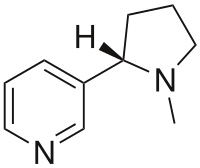Nicotine withdrawal
| Nicotine withdrawal | |
|---|---|
 |
|
| Nicotine | |
| Classification and external resources | |
| Specialty | psychiatry |
| ICD-10 | F17.2 |
| ICD-9-CM | 292.0 |
| MedlinePlus | 000953 |
Nicotine withdrawal is a group of symptoms that occur in the first few weeks upon the abrupt discontinuation or decrease in intake of nicotine. Symptoms include cravings for nicotine, anger/irritability, anxiety, depression, impatience, trouble sleeping, restlessness, hunger or weight gain, and difficulty concentrating. A quit smoking program may improve one’s chance for success in quitting nicotine. Nicotine withdrawal is recognized in both the American Psychiatric Association Diagnostic and Statistical Manual and the WHO International Classification of Diseases.
The most documented symptoms are cravings for nicotine, anger/irritability, anxiety, depression, impatience, trouble sleeping, restlessness, hunger or weight gain, and difficulty concentrating. Symptoms are usually strongest for the first few days and then dissipate over 2-4 weeks. Withdrawal symptoms make it harder to quit nicotine products and most methods for quitting smoking involve reducing nicotine withdrawal. The most common symptoms are irritability, anxiety and difficulty concentrating. Depression and insomnia are the least common. Other withdrawal symptoms may include constipation, cough, dizziness, drowsiness, headache, impulsivity, fatigue, flu symptoms, mood swings, mouth ulcers, and increased dreaming. Cessation of nicotine usually increases eating and weight, decreases memory, decreases the ability to pay attention and concentrate on tasks, and decreased heart rate. Cessation of tobacco can also require changes in levels of various medications.
Nicotine withdrawal is the effect that nicotine-dependent individuals experience after they discontinue or decrease nicotine use. Nicotine is an addictive substance found most commonly in tobacco and tobacco products including cigarettes, cigars, chewing tobacco, pipe tobacco, snus, snuff, and most e-cigarettes. Withdrawal is the body’s reaction to not having the nicotine it had become accustomed to. Withdrawal is most common and intense in cigarette smokers and intermediate in smokeless users. The symptoms of nicotine withdrawal usually appear 2-3 hours after last intake of nicotine and peak in 2-3 days. In a minority of smokers, cravings may last for years. Nicotine withdrawal causes few physical signs and is not life-threatening but associated cravings can be as severe as withdrawal from other drugs. There is some evidence that stopping nicotine may make a prior psychiatric problem worse but this is uncertain. After the initial withdrawal period, anxiety, depression, and quality of life generally improve such that former smokers are better off than continuing smokers.
...
Wikipedia
